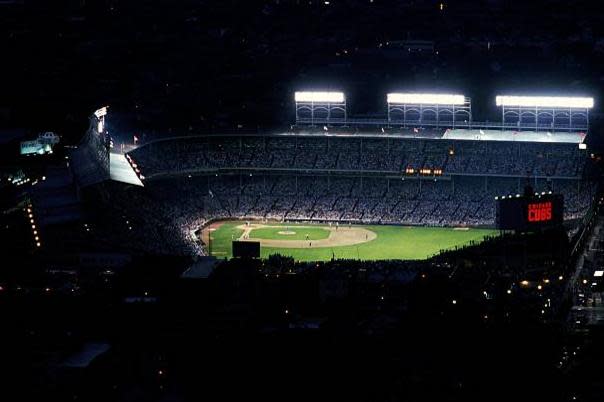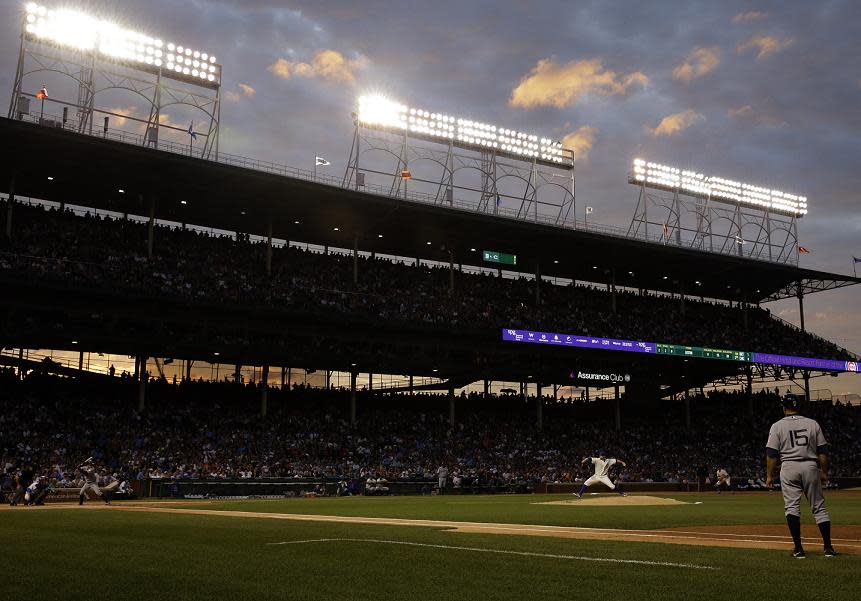Why Cubs Friday night game at Wrigley Field was likely a one-time deal

The Chicago Cubs cleared their biggest hurdle last season, finally winning their first World Series since 1908. But they still haven’t been able to clear perhaps their next biggest hurdle, which is convincing the city of Chicago to allow them more night games at Wrigley Field.
The two sides have been going round and round for years with some slight concessions being made along the way. The most recent came last week when the City Council allowed the Cubs to move Friday’s game against the Brewers from 1:20 p.m. to 7:05 p.m., thus making it the first regular season Friday night game in Wrigley Field history. The city has indicated it will be a one-time only exception to accommodate the Cubs rough travel schedule, but that’s not likely to stop the team from asking for more.
[Sign up for Fantasy Football before it’s too late! Draft now for free]
Right now the Cubs are allowed 43 night dates per season, plus an additional three if they limit other nighttime, non-baseball events, which includes hosting concerts. In 2017 the league average is 54 night dates, and that seems to be the number the Cubs are shooting for in order to “level” the playing field.
Manager Joe Maddon has been among the most vocal on the Cubs side. That’s been true since his arrival in November of 2014, and it continued last month when Maddon expressed concerns about his players getting proper rest with so many day games after night games in Chicago.
“Friday day games, we just play way too many day games during the week,” Maddon said before a Friday afternoon game against the Nationals on Aug 4., which was the second of four straight afternoon games. “We just do. I’m just being honest. Guys need their rest. I mean, when you’re constantly going night-day or day-day-day and it’s hot during the summer time, it matters. It definitely matters. So it’d be wonderful if we could get to a more conventional method regarding the number of night games versus day games.”

Those concerns clearly played into the city’s decision in this specific case. The Brewers were off on Thursday ahead of the crucial weekend series, while the Cubs were forced to play a night in Pittsburgh that started only 18 hours before the Friday game was originally scheduled. That’s with an hour rain delay factored in. It doesn’t factor in travel though, which would have made that turn around nearly impossible to manage.
The Brewers were not fans of the time change, and perhaps that’s motivated them to an extent. They handily won on Friday, 2-0, and then followed up with a 15-2 blowout win on Saturday afternoon.
Cubs president of business operations Crane Kenney had similar pleas about adding more night games. In a July interview with 670 The Score in Chicago, Kenney was critical of the city’s stance. His comments actually drew a direct response from Chicago mayor Rahm Emanuel, who pointed out that the Cubs would have had extra night dates available but have decided to use those dates to book numerous concerts rather than schedule baseball games. From the Chicago Tribune:
“They chose to use those evening opportunities for concerts,” Emanuel said during a news conference after the City Council meeting. “They said it, and Crane Kenney said it himself, so they can make more money.
“They made those choices,” Emanuel said. “Now they want to change the consequences of the choices they made. If you add up night games and concerts, it comes really close to the 54, which is 46. They could do it, more night games, but they didn’t want to do it.”
This summer alone Wrigley Field has hosted Tom Petty, James Taylor, Jimmy Buffet, Billy Joel, Florida Georgia Line, Green Day and Lady Gaga. It seems the Cubs have made their priority clear from a business standpoint, which is why Emanuel is standing firm.
Emanuel also noted that Wrigley sits “in the middle of a neighborhood,” saying that adding more night games on top of current limits was to “ask the taxpayers of the city of Chicago to pay for that choice. No, you make these choices, you will live with the consequences of the choices. That’s how this works.”
We could debate all day whether the Cubs deserve more leniency. After all, they’re a pretty big attraction for the city. But everyone knows the agreements that are placed, and until there’s a change in the city’s perspective it will be up to the Cubs to adjust their planning.
More MLB coverage from Yahoo Sports:
– – – – – – –
Mark Townsend is a writer for Big League Stew on Yahoo Sports. Have a tip? Email him at bigleaguestew@yahoo.com or follow him on Twitter!

 Yahoo Sports
Yahoo Sports 

